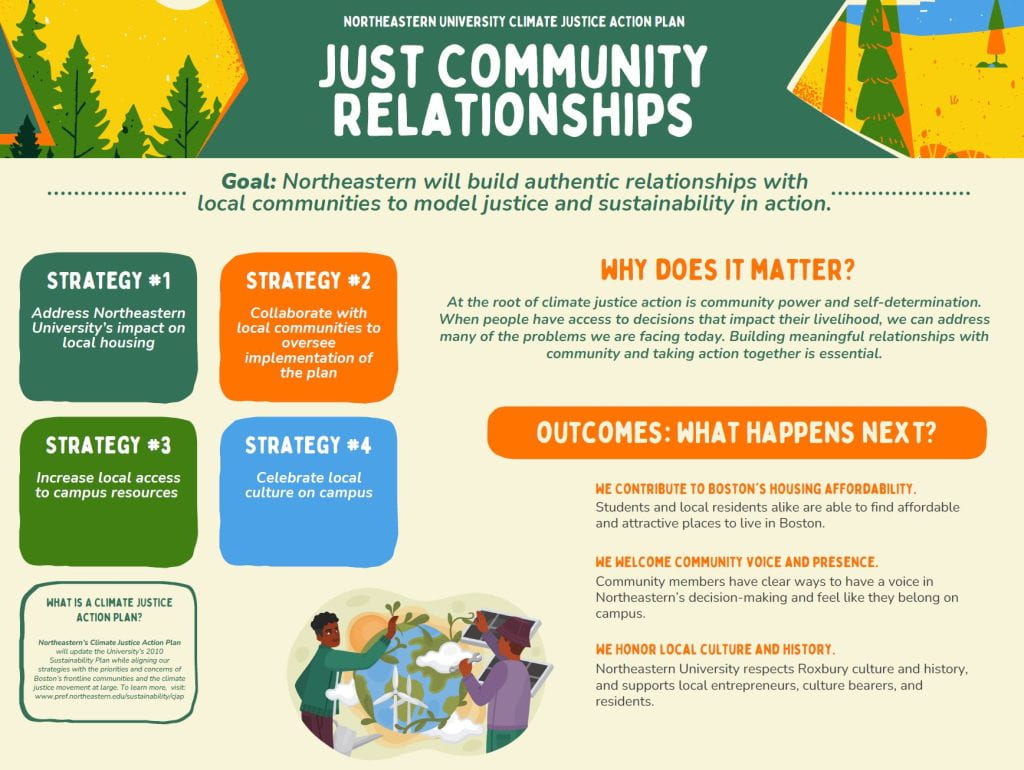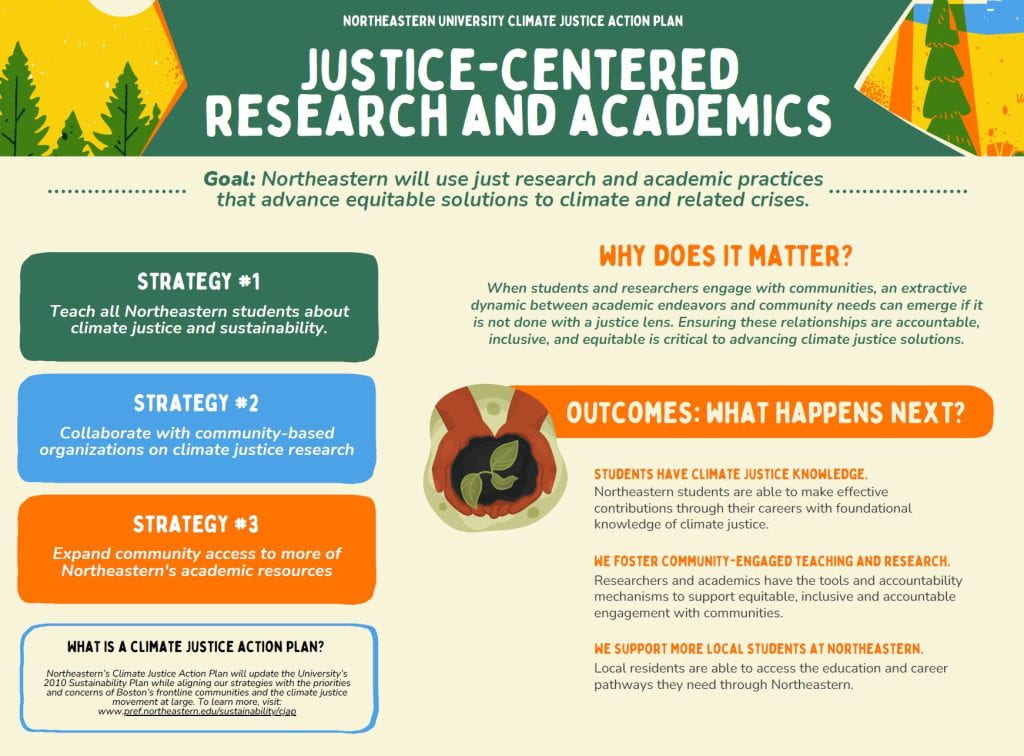Climate Justice Action Plan
Northeastern University Climate Justice Action Plan
Learn about the four goal areas of the Climate Justice Action Plan and review draft strategies and actions. Email Sustainability@northeastern.edu if you have any questions or comments.
Northeastern Reveals Draft Climate Justice Action Plan
View CJAP Draft Plan
Environmentally Healthy Campus
This goal aims to improve community health and contribute to addressing climate change by reducing emissions, consumption, congestion, and increasing green space, healthy buildings, and improving transportation on and around the Northeastern University Boston Campus.
Just Community Relationships
At the root of climate justice action is community power and self-determination.
When people have access to decisions that impact their livelihood, we can address
many of the problems we are facing today. Building meaningful relationships with
community and taking action together is essential.
Regenerative Economies
A regenerative economy works to restore the environment, protect working-class communities, and build equitable partners and democratic processes. This work guides Northeastern’s investments to help shift systems to achieve these goals.
Justice-Centered Research & Academics
When students and researchers engage with communities, an extractive dynamic between academic endeavors and community needs can emerge if it is not done with a justice lens. Ensuring these relationships are accountable, inclusive, and equitable is critical to advancing climate justice solutions
Connect, contribute, and learn
Perspectives on Northeastern's role in climate action
Faculty Senate’s report on Climate Justice Action
Connect with the Climate Hub
Get Involved
Subscribe to our Newsletter
More about the Climate Justice Action Plan
Why Climate Justice?
Climate change is about more than pollution and emissions. At the root of the issue is social inequality and institutionalized racism that enables the exploitation of land, people, and resources to such a severe degree that our climate is changing and low-income and BIPOC communities across the world are suffering disproportionally. Climate justice seeks to address these systemic root causes by advancing a just transition away from fossil fuels and the extractive economy.
Background
Fifteen years ago, Northeastern University President, Joseph Aoun made sustainability a top priority for the University. The University was a founding member of the 2007 American College & University Presidents Climate Commitment, which helped launch a national movement of colleges and universities acting on climate and sustainability. The University also designated sustainability as one of the university’s three main research thrusts. The academic plan released in 2021, Experience Unleashed, reaffirms Northeastern’s commitment to maximizing its positive impact in our communities and in the world and restoring trust in higher education’s capacity to solve the world’s hardest problems, namely food, water, energy, and sustainability.
In 2010, the University’s Office of Sustainability developed NU’s first Climate Action Plan. Since then, we have made significant progress in addressing climate and sustainability on campus. As of 2021, greenhouse gas emissions have been reduced by 27%, and since 2020, the University has been offsetting 100% of its emissions1. This progress is the result of investments in energy conservation measures and setting ambitious standards for new construction. For example, the new Interdisciplinary Science and Engineering Complex (ISEC) achieved LEED Gold, and the forthcoming EXP research building is seeking LEED Platinum. The new Roux Institute in Portland is going beyond LEED and striving to be completely fossil-fuel-free.
Other factors reducing emissions are our waste diversion programs and transportation efforts. For example, Northeastern diverts 44% of the waste from the Boston campus and is rolling out new programs like textile recycling and composting in our residence halls to further reduce waste. Our Boston campus also has low transportation emissions because 95% of students and 68% of employees are taking alternative transportation to campus. NU has a variety of programs to help students, faculty, and staff find low-carbon transportation options, such as bike share discounts and docking stations on campus, electric vehicle charging, and car share discounts. The University is also electrifying its fleet with the addition of new electric cars and trucks to the over 30 electric utility vehicles already on campus.
The Process
To develop a plan that aligns with frontline communities’ priorities and concerns, the Hub is partnering with Alternatives for Community and Environment, a grassroots environmental justice organization in Roxbury, and One Square World, a community-centered planning and facilitation organization based in Jamacia Plain. Over the next two years, we’ll be working together to:
- Ensure that the climate justice process is accountable to community members most impacted by climate injustice in Boston
- Ensure that participants in the climate justice planning work have a foundational knowledge of structural oppression, environmental justice, and intersecting issues through anti-racism and environmental justice trainings.
- Identify climate justice priorities and concerns affecting the people most impacted by climate injustice in Boston
- Develop Vision, Goals, and Strategies for Northeastern’s Climate Justice work
- Ensure the final climate justice plan meets accountability goals
What We Have Done So Far
- NU Community Conversation, October 2021
- Launched Hub at Panel Event: Student, faculty, and community perspectives on NU’s role in climate action, April 2022.
- Hired community-based consultants, August 2022.
- Hosted racial equity trainings for faculty, students, staff, and community partners, March 2022.
- Convened Steering Committee made up of NU faculty, students, and staff, as well as environmental justice leaders in Boston, Feb. 2023.
- Hosted community conversations to identify community priorities and concerns, May 2023
- Through facilitated meetings, engaged with frontline community organizations and the university community to develop Northeastern’s response to community priorities and concerns, Fall 2023
- Hosted the CJAP Community Conversation and Art Showcase to present the draft plan and obtain final feedback from the community and Northeastern staff, faculty, and students, March 2024
What's Next
- Develop a final document and facilitate a steering committee meeting to come to an agreement on a final plan to present back to community members, Spring 2024
Climate Justice Definition
Developed by the Faculty Senate Committee on Climate Justice Action Planning, April 2021
Moving beyond traditional climate action focused narrowly on goals for emissions reductions, climate justice action recognizes that: (1) many policies, processes, and practices of wealthy nations and established institutions are the drivers of climate change; 2) the impacts of climate disruptions and the capacity to adapt are distributed unequally among and within local and global communities; 3) equitable climate adaptation and strengthening climate resilience requires new transformative investments, innovations, and actions to rectify the disproportionate burdens on those who are most vulnerable to ongoing and future climate impacts. Climate justice action thus involves striving for transformative systemic changes that integrate technological and social innovation while prioritizing social, racial, and economic justice.
Within higher education, climate justice action requires continual assessment and systemic intention to prioritize inclusive social and political processes, policies, and practices that reduce climate risks and strengthen climate resilience for marginalized communities rather than perpetuating inequities and disparities. Climate justice includes committing to a more equitable, inclusive, diverse, and accessible university community and ending fossil fuel reliance within our communities and campuses. Climate justice also involves expanding our commitment to partnering with and serving under-invested-in communities and communities of color who continue to be more vulnerable to increasingly frequent and intense climate disruptions and whose health and well-being are disproportionately harmed by fossil fuel use. These partnerships facilitate the co-design and co-development of innovations that build on the many resources and skills within Northeastern while ensuring that our strategies and actions meet the needs of and priorities of broader networks of communities. Prioritizing climate justice is both an opportunity and a responsibility for any university committed to advancing racial justice, rebuilding community relations, and restoring ecosystems.
Draft Goals
Based on input from faculty, students, and community leaders, the Hub established four goals to guide its work and advance climate justice across Northeastern. These goals will be refined with additional input from university-adjacent environmental justice communities.
- Campuses will be models of sustainable, resilient, healthy, interconnected, and just communities.
- Contribute to building a just and regenerative economy locally and globally.
- Enact just research and academic practices that advance equitable solutions to the climate crisis.
- Build equitable relationships with local communities to model place-based justice and sustainability in action.


